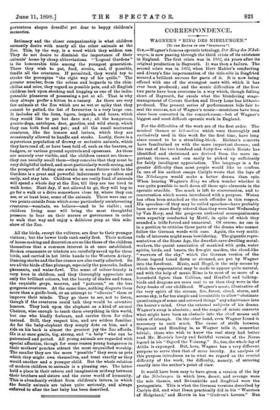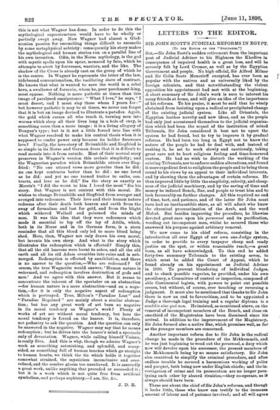CORRESPONDENCE.
WAGNER'S "RING DES NIBELUNGEN."
pro THE EIHTOE OF THE "SPILOTATOR..1 Si a,—Wagner's famous operatic tetralogy, Der Ring des Hibel- ungen, is now passing through the third crisis of its existence in England. The first crisis was in 1882, six years after its original production in Bayreuth. It was then a failure. The second crisis was in 1892, when Herr Mahler's conducting and Alvary's fine impersonation of the title-rale in Siegfried secured a brilliant success for parts of it. It is now being offered with one of the strongest casts with which it has ever been produced; and the scenic difficulties of the first two parts have been overcome in a way which, though falling short of Bayreuth, far excels what the blundering stage- management of Covent Garden and Drury Lane has hitherto produced. The present series of performances bids fair to seal the success, not of Wagner's music—musicians have long since been converted in the concert-room—but of Wagner'a biggest and most difficult operatic work in England.
For the difficulties of the work are of the first order. The musical themes or /eit-niaties which were thoroughly and exclusively used in this work for the first time, have long since ceased to be a stumbling-block. Richter's concerts have familiarised us with the more important themes; and the rest of the two hundred and forty-five which Heintz has identified and christened are derived from the more im- portant themes, and can easily be picked up sufficiently for fairly intelligent appreciation. The language is a far greater difficulty than most people would like to confess. In one of his earliest essays Carlyle wrote that the lays of the Nibelungen would make a better drama than epic. When hearing Wagner's Ring we often wonder whether it was quite possible to melt down all these epic elements in the operatic crucible. Too much is left to conversation, and to conversation which seems introduced with a purpose. Wotan has often been attacked as the arch offender in this respect. His speeches—if they may be called speeches—have probably been never more finely uttered than they were last Wednesday by Van Rooy, and the gorgeous orchestral accompaniments were superbly conducted by Mottl; in spite of which they sounded a trifle forced and unnatural. Of course, no one is in a position to criticise these parts of the drama who cannot follow the German words with ease. Again, the very multi- tude of interests might seem bewildering. The gigantic repre- sentatives of the Stone Age, the dwarfish cave-dwelling metal- workers, the quaint association of mankind with gods, water spirits, birds, and beasts, the fire-girt maiden, the cloud-like "warriors of the sky," which the German version of the Norse legend toned down or shunned, are put by Wagner into the forefront. Music, said Hegel, is the only means by which the supernatural may be made to appear quite natural, and with the help of music Mime is to most of us more of a household figure than Caliban, and Hindfell and talking. birds and dragons are more real to us than they were in the fairy-books of our childhood. Wagner's music, illustrative of the very spirit of the stream, fire, forest, cloud, storm, and serene sky, is far too simple and irresistible to allow "obstinate questionings of sense and outward things" any admittance into the hearer's mind. Over the external subjects of his drama Wagner's sway is absolute ; and the magic of music converts what might have been an obstacle into the chief means and token of triumph. On the other hand, even Wagner found it necessary to omit much. The cause of strife between Siegmund and Hunding is, as Wagner tells it, somewhat trivial ; those who wish to know the real story had better read Mr. Morris's lovely and faithful version of the Norse legend in his "Sigurd the Volsung." So, too, the whole lay of Attila is expunged. Bat, here, Wagner has a very different purpose to serve than that of mere brevity. An analysis of this purpose introduces us to what we regard as the crucial difficulty of the work, the difficulty, namely, of entering exactly into the author's point of view.
It would have been easy to have given a version of the lay of the Nibelungen in which love, deceit, and revenge were the sole themes, and Briinnhilde and Siegfried were the protagonists. This is what the German versions described by Carlyle did, and what Ibsen practically did in his "Warriors of Helgeland," and Morris in his "Gudrun's Lovers." Bat
this is not what Wagner has done. In order to do this the mythological superstructure would have to be wholly or partially swept away. Now Wagner had almost a Glad- stonian passion for reconciling things difficult to reconcile by some metaphysical subtlety : consequently his story makes the mythological and human stories run on a parallel line of his own invention. Odin, in the Norse mythology, is the god with mystic spells upon his spear, menaced by fate, which he attempts to avert by fortresses, warriors, and the like. The shadow of the Cross is already cast on the group of which be is the centre. In Wagner he represents the letter of the law, hidebound conventionalism, the vacillating slave of contract. He knows that what is wanted to save the world is a rebel hero, a swallower of formula), whom he, poor parchment-king, must oppose. Nothing is more pathetic at times than this image of paralysed omnipotence : "What I love," he says, " I must desert, and I must slay those whom I yearn for :" but however pathetic it may be at times, we never can forget that it is but an image devised to illustrate a paradox. Again, the gold which curses all who touch it, turning men into worms which sleep all their lives long in a hole of envy, is something more than a mere image : it is a living allegory of Banyan's type ; but is it not a little forced into line with what Wagner resolved to make his central thesis when it is supposed to confer power only because its holder forswears love ? Finally, the love-story of Briinnhilde and Siegfried is so simple in its Norse and German dress that it is difficult to read morals into it from outside. Most of their mutual story preserves in Wagner's version this archaic simplicity; and the Wagnerian paradox which Briinnhilde utters over Sieg- fried: "No one uttered vows more genuine than he did : no one kept contracts better than he did : no one loved as he did : and yet no one turned traitor to oaths, con- tracts, and love as he did," fits the story as exactly as Morris's "I did the worst to him I loved the most" fits his story. But Wagner is not content with this moral. He wishes to change Briinnhilde and Siegfried from avenger and avenged into redeemers. Their love and their human nature redeems after their death both heaven and earth from the sway of formalism and lust for gold, and from the blight which withered Walhall and poisoned the minds of men. It was this idea that they were redeemers which made it essential to lop off the lay of Attila, which, both in its Norse and in its German form, is a stern reminder that all this blood only led to more blood being shed. Here, then, Wagner not only draws his own moral, but invents his own story. And what is the story which illustrates the redemption which is effected ? Simply this, that all the old heavens were burnt to ashes, and all the old earth and all its old Adam crumbles into ruins and is sub- merged. Redemption is effected by annihilation, and there is no answer to the question,—Who are redeemed ? Of course, the true Wagnerite would answer, 'Human nature is redeemed, and redemption involves destruction of gods and men.' And we agree with this answer. But it seems to concentrate the interest of the spectator on an abstraction —for human nature is a mere abstraction—and on a nega- tion,—for it is only the negative aspect of redemption which is portrayed. True, Milton's "Paradise Lost" and "Paradise Regained" are mainly about a similar abstrac- tion; but has any great work of art been so negative in its moral tendency as Wagner's work Plenty of works of art are without moral tendency, but here the moral tendency is forced on the hearer. It is, therefore, not pedantry to ask the question. And the question can only be answered in the negative. Wagner may say that he means redemption ; but he drives into the hearer's mind a spectacle only of devastation. Wagner, while calling himself Vishnu, is really Siva. And this is why, though we admire Wagner's work as something astonishing, and splendid, and many- sided, as something fall of human touches which go straight to human hearts, we think the tie which holds it together somewhat strained, the mysticism inconclusive and over- refined, and the sombre gloom too unrelieved. It is assuredly a great work, unlike anything that preceded or succeeded it ; but it is a work which is not quite free from artificial symbolism, and perhaps sophistry.—I am, Sir, J. D. R.







































 Previous page
Previous page